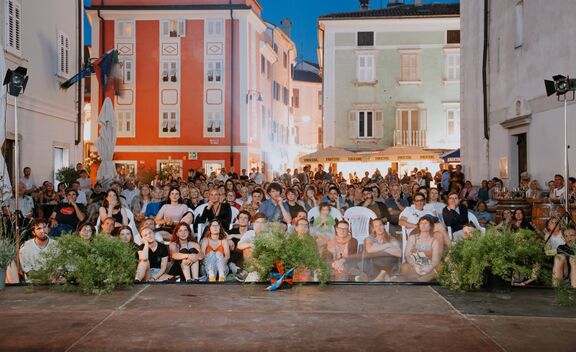Difference between revisions of "Kino Otok - Isola Cinema Festival"
m (frequency out) |
m (italics for sections) |
||
| Line 67: | Line 67: | ||
==Festival sections and awards== | ==Festival sections and awards== | ||
| − | The Kino Otok – Isola Cinema Festival has 7 sections and one of those, the main Harvest section, is competitive. Still the Kino Otok festival is not a classical competitive festival since it doesn't have a proper jury. The winning film is namely selected by calculating the average vote from all the votes for a single film (whoever buys a ticket can vote) and the film with the higher average vote is the winner. Traditionally five films are selected for the Harvest section and those then compete for the main audience award which brings the winning film paid distribution in the Slovene cinema network. Some of the past winners of the festival are ''Saratan'' by Ernest Abdidzhaparov, ''Granny'' [Babusya] by Russian director Lidia Bobrova and ''Full or Empty'' by Iranian New Wave filmmaker Abolfazl Jalili. | + | The Kino Otok – Isola Cinema Festival has 7 sections and one of those, the main ''Harvest'' section, is competitive. Still the Kino Otok festival is not a classical competitive festival since it doesn't have a proper jury. The winning film is namely selected by calculating the average vote from all the votes for a single film (whoever buys a ticket can vote) and the film with the higher average vote is the winner. Traditionally five films are selected for the ''Harvest'' section and those then compete for the main audience award which brings the winning film paid distribution in the Slovene cinema network. Some of the past winners of the festival are ''Saratan'' by Ernest Abdidzhaparov, ''Granny'' [Babusya] by Russian director Lidia Bobrova and ''Full or Empty'' by Iranian New Wave filmmaker Abolfazl Jalili. |
The festival places a great importance on its guests: should they be artists, professional partners, or journalists, the festival considers them simply as "friends". So one of the sections is dedicated to them – the ''Friends'' section. Friends of the Kino Otok Festival are given the chance to bring their friends and films – with no limitations. Among the standard members of the ''Friends'' "gang" are the British film critic Neil Young, the director of the Innsbruck film festival Helmut Groschup, and the Germany-based critic of the magazine ''Film Comment'' Olaf Möller. | The festival places a great importance on its guests: should they be artists, professional partners, or journalists, the festival considers them simply as "friends". So one of the sections is dedicated to them – the ''Friends'' section. Friends of the Kino Otok Festival are given the chance to bring their friends and films – with no limitations. Among the standard members of the ''Friends'' "gang" are the British film critic Neil Young, the director of the Innsbruck film festival Helmut Groschup, and the Germany-based critic of the magazine ''Film Comment'' Olaf Möller. | ||
Revision as of 15:39, 9 February 2010
-
to
16 Apr 2015
17 Jun 2015
A presentation of the Kino Otok - Isola Cinema Festival at the Festival Market at the 9th Jewish Film Festival – Festival of Tolerance
Festival sections and awards
The Kino Otok – Isola Cinema Festival has 7 sections and one of those, the main Harvest section, is competitive. Still the Kino Otok festival is not a classical competitive festival since it doesn't have a proper jury. The winning film is namely selected by calculating the average vote from all the votes for a single film (whoever buys a ticket can vote) and the film with the higher average vote is the winner. Traditionally five films are selected for the Harvest section and those then compete for the main audience award which brings the winning film paid distribution in the Slovene cinema network. Some of the past winners of the festival are Saratan by Ernest Abdidzhaparov, Granny [Babusya] by Russian director Lidia Bobrova and Full or Empty by Iranian New Wave filmmaker Abolfazl Jalili.
The festival places a great importance on its guests: should they be artists, professional partners, or journalists, the festival considers them simply as "friends". So one of the sections is dedicated to them – the Friends section. Friends of the Kino Otok Festival are given the chance to bring their friends and films – with no limitations. Among the standard members of the Friends "gang" are the British film critic Neil Young, the director of the Innsbruck film festival Helmut Groschup, and the Germany-based critic of the magazine Film Comment Olaf Möller.
The most eclectic festival section is the Open Island section as various views, recognisable poetics and aesthetics, and different creative methods meet within it. Meanwhile the most peculiar section is surely the Silvan Cinema School. Defined as "a space, not a school, a space for experiencing and narrating films, films and life", it is dedicated to Silvan Furlan, the godfather of the festival and founder of the Slovenian Cinematheque.
The remaining three sections are: Doc Focus which concentrates on documentary approach and offers a set of documentaries questioning current social topics; Island Animateque where the animated films from the children's programme Red Elephant are shown; and the Video on the Beach in which young and unknown (and mostly Slovene) authors present their short works.
Some notable guests of the festival from the past years are Lisandro Alonso, Pablo Trapero, Abolfazl Jalili, Apichatpong Weerasethakul, Tsai Ming-liang, Nishtha Jain, Albertina Carri, Darren Dean, and Young Seok Noh.
Workshops and lectures
Workshops and lectures are also among the events hosted at the Kino Otok Festival. The Happy DV workshop, organised in collaboration with Luksuz Production, DZMP, enables local film enthusiasts to get acquainted with the practical and theoretical secrets of the seventh art and make their own short films. Introduced already in the festival's first year, it has attained quite a success among the regular followers of the festival. Even more successful have been the lectures that follow the films screened in the Silvan Cinema School section. Other similar events have a more occasional character (they are usually linked to visiting guests).




